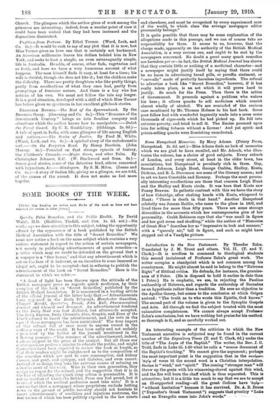SOME BOOKS OF TILE WEEK.
[Under this heading vs notice such Books of the week as haus not bun resertcd for review in other forms.] Quccks, False Remedies, and the Public Health. By David Walsh, M.D. (Bailliere, Tindall, and Cox. is. (3d. net.)—Six we.ehs ago we drew attention to this subject, taking the opportunity etfe.red by the appearance of a- book published by the British Medical Association with the title of "Secret Remedios." We must now notice a bock on the same subject which contains a very serious statement in regard to the action of certain newspapers, n merely in publishing advertisements of quack remedies—a p actiz...e which may no doubt be defended on the ground that a is wspaper is a "free house," and that any advertisement which is uot on the face of it indecent, or an incentive to some immoral or illegal act, ought to he accepted—but in refusing to publish the adver■Lannent of tho Look on "Secret Remedies." Here is the statement to which we refer:—
" A flood of light has been thrown upon the attitude of the British uewspaper preys as regards quack medicines, by their recap hex of the book en Secret Remedies,' published by the British Medical Association. It is announced in a leading article
of the official journal of the latter body that Advertisements have nepeared in the Daily l'elsgraph, Manchester Guardian, Clzsgow Herald, Spectator, Punch, John Bull, Pharmaceutical Journal, and Chemist and Druggest. An advertisement tendered to the Daily Mail was first declined, but afterwards accepted. The latis,e Express, Daily- Chronicle, Star, Graphic, and News of the liorN refused to insert the advertisement, and the veto in the case of these newspapers has been maintained.' The true import of this refusal will at once occur to anyone versed in the onlime y ways cf the world. It has been aptly and not unfairly repressated by the Editor of the journal mentioned in the I hewing passage The romance of the advertisement, indeed, tie& no support in the prose of the analyst. But all these our e.mterupormies profess a mission to educate the public, and might themselves have been expected to review the book at length, so tSat their readers might be enlightened as to the composition of the remedies which are said to cure consumption, and kidney eiRMSC, and gout, and epilepsy, and diabetes, and even cancer. Instead of so doing, they take the extreme course of refusing an advertia snout cf the work. Wise in their own generation, they azi.ignno reason for the refusal, and the suggestion that it is in the fcar of offe.nding the quack drug sellers is permissible. It is not an incident of which the British Press can feel proud, but it is arse of v. hich the medical profession, must take note.' It is a curious fact that a newspaper whose proprietors exclude- betting ness on the ground of public morality should not hesitate to insert advertisements of worthless and injurious nostrums, the real nature of which has been publicly exposed in the law courts
and elsewhere, and must be recognised by every experienced man of the world, to which class the average newspaper editor presumably belongs."
It is quite possible that there may be some explanation of the allegations made in this passage, and we can of course take no responsibility for them. It seems to us, however, that the charge made, apparently on the authority of the British Medical Association, is a very serious one, and ought to be met by the newspapers concerned. No doubt a great many quack remedies are harmless per se—in fact, the British Medical Journal has shown that they contain little or nothing of a medicinal character—and a newspaper might justify itself by saying that there could be no harm in advertising bread pills, or paraffin ointment, or "cure-ails" made of perfectly harmless ingredients. The refusal to advertise a book like "Secret Remedies," however, if it has really taken place, is an act which it will prove bard to justify. So much for the Press. Then there is the action of Government. It proceeds against a publican who waters his beer ; it allows quacks to sell medicines which consist almost wholly of alcohol. We are reminded of the curious case mentioned by Mr. Thomas Holmes in his last book. Some poor fellow had with wonderful ingenuity made into a cross some thousands of cigar-ends which he had picked up. He fell into extreme poverty, and tried to sell it. The Excise pounced upon him for selling tobacco without a license ! And yet spirit- and poison-selling quacks were flourishing unmolested.






















































 Previous page
Previous page